Dăm Click pe România (“Let’s Click on Romania”) donates refurbished computers to schools, NGOs and public institutions to help reduce the educational gap that disadvantages children from poor backgrounds. The project avoids waste by collecting used computers and provides employment to people in vulnerable situations who repair the equipment. The computers then have a second life, in TIC (Information and Communication Technology) classes or other activities to help students acquire basic digital skills.
The main objective of the project is the donation of computers to schools that are in vulnerable areas or that have in their structure students who are part of marginalized groups, who do not have access to technology outside of class hours.
Beyond the educational side, the project also has two secondary objectives that bring an impact in the environmental and social areas
Regarding the environmental impact, Dăm Click pe România offers a model of good practices in terms of avoiding waste and pollution by promoting reuse, all equipment donated to educational structures being collected by AFF as an authorized collector and reconditioned in the only workshop in Romania authorized by the Ministry of Environment to perform such activities.
The educlick workshop,where the equipment is reconditioned, brings the social component of the project: all employees working here to collect, check, clean, recondition and pack computers come from vulnerable groups who have difficulty accessing the labor market. Through the educlick workshop, they participate in a socio-professional integration program through which they are supported to gain confidence in their skills and to develop them so that after 2 years of training they will be able to enter the free labor market and access the rights to happiness and well-being.
Since starting the project in the fall of 2020, the project supported more than 30,000 students and teachers to access a better education, provided a job opportunity for more than 30 vulnerable adults, of which 5 already are already employed in the open job market, and avoided CO2 emissions of 576.000,00 kg
Please highlight how the project can be exemplary in this context
For the last two years, Dam Click pe Romania (Let’s Click on Romania) donated 4.000 refurbished computers to schools, NGOs and public institutions through a process that consists of three main activities:
- collecting used computers (WEEE) from the private sector by constantly advocating for the reusing of computers instead of throwing out old IT equipment. We promote a transition to a climate friendly lifestyle both at work and at home in the transition to a climate neutral society
- refurbishing the devices within our workshop by employees who are people coming from vulnerable situations. This creates an awareness about climate change among marginalised audiences and encourages them to become an active part in the fight against it.
- donating the IT equipment to schools, NGOs and public institutions working with children and young people from disadvantaged areas across Romania. In the process, we educate the beneficiaries on the advantages of a circular economy and offer a model of good environmental practice for the younger generations.
The objectives of the project in terms of climate action are to carry out a project that facilitates the transition to a climate neutral society and promotes a sustainable lifestyle that can be implemented by every company or individual: the reuse of old IT equipment.
With 4,000 computers donated in 13 years, we have avoided emission of more than 576.000,00 kg of CO2, as every computer that is refurbished instead of made into waste saves around 144 kg of CO2.
Moreover, we have recently started to run awareness campaigns about climate change and the circular economy for the general public as we are aiming to gather more equipment from individuals.We are constantly holding workshops and promoting upcycling models that aim at the ultimate goal of increasing awareness among the general public about climate change actions that can be implemented daily by everyone.
Please highlight how the project can be exemplary in this context
Dăm Click pe România/ Let's click on Romania it started as a small scale project dedicated to equipping some schools with computers. Nowadays, the project is rather a platform not only addressing the lack of computers, but also know-how exchange and leaving no one behind. Teachers and students face similar challenges in terms of digital skills and our project manages to bring them together and form a community based on shared knowledge. In this respect, the project provided learning contexts such as webinars, workshops and on site visits where the members of the community had the chance to interact, share their challenges and solutions.
Nonetheless, our project is about growing by interacting and sharing socially and emotionally. The disadvantaged workers learn professional skills, but they also learn empathy and giving back. This is why we create settings in which the people working on the computer refurbishment have the chance to meet those in need of the computers. On the other hand, teachers and students learn from such interactions aspects such as acceptance and non-judgemental thinking. This contributes to a better social cohesion in the long term.
The project is also about respecting the limited resources of the planet, as we extend the life of the computers and avoid exploiting other resources.
Dăm Click pe România/ Let's click on Romania creates an ecosystem that tackles social, educational and environmental issues with respect towards human needs and planetary boundaries.
Please highlight how the project can be exemplary in this context
Dam Click pe Romania is fighting for social inclusion by providing a second chance for the vulnerable groups that are often stigmatized by society and abandoned by public authorities from an early age (former detainees, drug addicts, minorities, victims of domestic abuse, children from foster homes etc.). At our workshop, our colleagues have the chance to access a socio-professional integration programme that supports their personal and professional development, offering them the opportunity to regain control over their life and happiness.
As one of the first work integration enterprises in the country, educlick aims to offer a safe work space where they can adapt to the requirements of a job through a two year programme with individual customized professional and social assistance.
Our colleagues have an average of 7-8 vulnerabilities that stop them from accessing the labour market. Most of them live in Bucharest and we are able to reach them through our network of partners from public social institutions or local NGOs. educlick offered for more than 200 beneficiaries the chance to develop professional skills that can allow them access better life opportunities. To ensure their reintegration, we are monitoring their activity for 6 months after they have left the programme for a job in the private sector. Since 2008, around 50% of our colleagues found a job in the open labour market after their programme at educlick.
Please highlight how this approach can be exemplary
The starting idea of the educlick workshop, where most of the project activities are implemented, was to impact social areas at once by collecting old digital equipment while training and preparing vulnerable adults for the job market.
We have noticed that many devices thrown away by companies where computers that could still be used are refurbished. Given the status of Romanian education where many schools from vulnerable areas lack the needed IT infrastructure, we have opened a new area in the workshop dedicated to the reusing of computers in the final aim of donating them to such schools.
Dam Click pe Romania is an initiative that started in the context of the global pandemic and online schooling, to which more than 1 million students did not have access due to the lack of devices. To address this issue, with the support of two strategic sponsors, we have developed a project that is better shaped to address the new digital challenges teachers and students alike might face in the new post-pandemic world, where the access to IT devices is a necessity for a chance to equal chances.
Therefore, the project creates a circle of solidarity through which NGOs, private companies, vulnerable people and public institutions work together for the future of education, environment and employment. Any strong community can replicate our model if multiple actors work together:
The impact of our activities is interconnected and therefore growing our customers/beneficiaries in one area will increase the overall impact of the workshop.
With more people choosing us to collect WEEE equipment we will be able to both recycle and reuse more computers or other devices. That can increase our social impact as we could donate more computers to schools and hire more vulnerable people.
We are already working towards these goals by starting to collect equipment from cities other than Bucharest, with more employees allocated to this department.
Since the fall of 2020, the project has donated 4.000 computers to 230 schools that ultimately supported the educational progress of more than 30.000 beneficiaries.
Besides the numbers achieved, we have managed to create a process that is trusted by companies and private individuals alike, both of these categories choosing to call us when they have an electronic waste rather than throw it away. With our campaigns we have managed to reach out to multiple audiences that understood how valuable the reusing concept is and offered them an example of how a small gesture for the environment can multiply and also support the education path of a child or the professional reintegration of a vulnerable person.
Moreover, as we have a direct link with children from vulnerable areas, we are making them and their communities a part of this process and that they understand how vulnerable the climate can be if we are not offering any support. We have started to visit the schools directly and offer training in terms of everyday reusing that can make a difference.
We also have a constant developing area of the project that is working as an IT support service through which schools can reach out to us if they face any digital challenges. By offering this option, we are encouraging teachers and schools principals to look at how they can repair a digital advice instead of immediately looking out to change it for a new one. In this regard, we are also offering training for the beneficiaries to become more autonomous.
Overall, besides the direct benefits of the project for the schools, employees and environment itself, we are using the donation programme as a platform to advocate for the reusing of devices, currently the most environmentally friendly option for the large masses of people.
Please also explain the benefits that derived from their involvement.
Dam Click pe Romania is a public advocate for climate positive actions within the private sector and general public from Bucharest and other big cities such as Cluj-Napoca, Timișoara etc. Both companies and individuals show a greater interest in reusing or recycling old pieces of equipment when they know that it might end up helping children from disadvantaged areas.
From this point of view, the project is a good model of `show, don’t tell` as it offers an alternative with positive social, not only environmental, impact that people can get behind and show more interest in.
As our collecting campaigns are addressed to large audiences from urban areas and the ultimate beneficiaries are small and medium size communities from vulnerable areas, we are connecting two otherwise divided sections of the country and offering them the chance to indirectly work together to dissolve the inequities between them.
Moreover, the main funding of the project is provided by two important actors of the private sector that provide a platform for advocacy in the environmental area that can reach the general public that might otherwise miss online campaigns.
Last but not least, we are working directly with other NGOs and social service institutions that recommend us potential employees that need our support to enter the labour market. By working closely with these types of institutions we are making sure that ideas such as sustainability and climate friendly are noticed and understood by the society as a whole, not leaving behind people from vulnerable areas.
Dam Click pe Romania is working to fight climate change as it gathers as an authorized collector the computers that would otherwise be dumped in the landfills, refurbishes them with the help of employees who very often lacked the chance of a better education themselves, and gives them a new life where they can help pupils from vulnerable areas to facilitate the access to a better education.
The objectives of the project initiative in terms of climate action are to carry out a project that facilitates the transition to a climate neutral society and promotes a sustainable lifestyle that can be implemented by every company or individual: the reuse of old IT equipment.
Moreover, the project is fighting against social injustice by giving responsibility to vulnerable people who face difficulties in accessing the free labour market and giving them the chance to bring a social impact for future generations.
This leads to the final challenge addressed by our project: educational inequity based on financial situation. Donating computers to schools where most students do not have access at home to a digital device provides a necessary step to offering children from disadvantaged backgrounds a chance to start in life with equal opportunities in accessing multiple professional areas.
Dam Click pe Romania is a unique initiative at a national level with three different areas positively affected by its mission of refurbishing and donating computers: education, social integration and climate action.
The most innovative element of the project stands in its diversity of both participants and beneficiaries, with a very careful consideration for a more diversified climate awareness among underprivileged people who are often left out of the climate actions.
Having a multitudinal mission means that its impact is reflected in multiple social and economical areas of the society, bringing together people with different backgrounds, from private companies of different sizes, to adults facing vulnerabilities and children from disadvantaged areas.
The platform is using its creativeness to share the benefits of reusing old IT equipment in a `show, don’t tell` manner, where the result of the refurbishment is having a big social impact in the society. By buying new equipment the costs would have been too high, showing that important environmental changes can have a quality impact in society for a lower budget too.
Please provide clear documentation, communication of methodology and principles in this context.
Dam Click pe Romania is an easy initiative to reproduce as our activity revolves around the simple concept of reusing materials and objects instead of polluting the environment with CO2 emissions from dumping them or manufacturing new ones.
One of the most beneficial conclusions of our project is that solving one or more social issues through an environmentally friendly process can increase the level of interest in climate fighting in the general population. We have noticed through our collecting WEEE campaigns that individuals are more willing to take an action for the environment if it also has another social impact. This is clearly an intermediary step, but a necessary one in order to inform more people about the benefits of reusing, recycling or other actions that can develop sustainable communities.
The goal of every climate action is not only to reduce pollution, but to replace with minimum impact another action that has a negative impact for the environment. In this regard, the general response to our project has been really positive from general public and beneficiary schools alike.
Another reason for which the initiative is one that should be more applied at the EU level stands in the multi-sectoral partnership between the private, public and NGO sector that is necessary in order to change social norms in the context of the climate crisis. Collecting WEEE from the private sector, refurbishing them by an NGO who donates the final product to public schools means that people from different backgrounds are part of the process, not only the beneficiaries of it.
Bringing people together is the only way to make sure that no one is left behind in the transition to a climate efficient society.
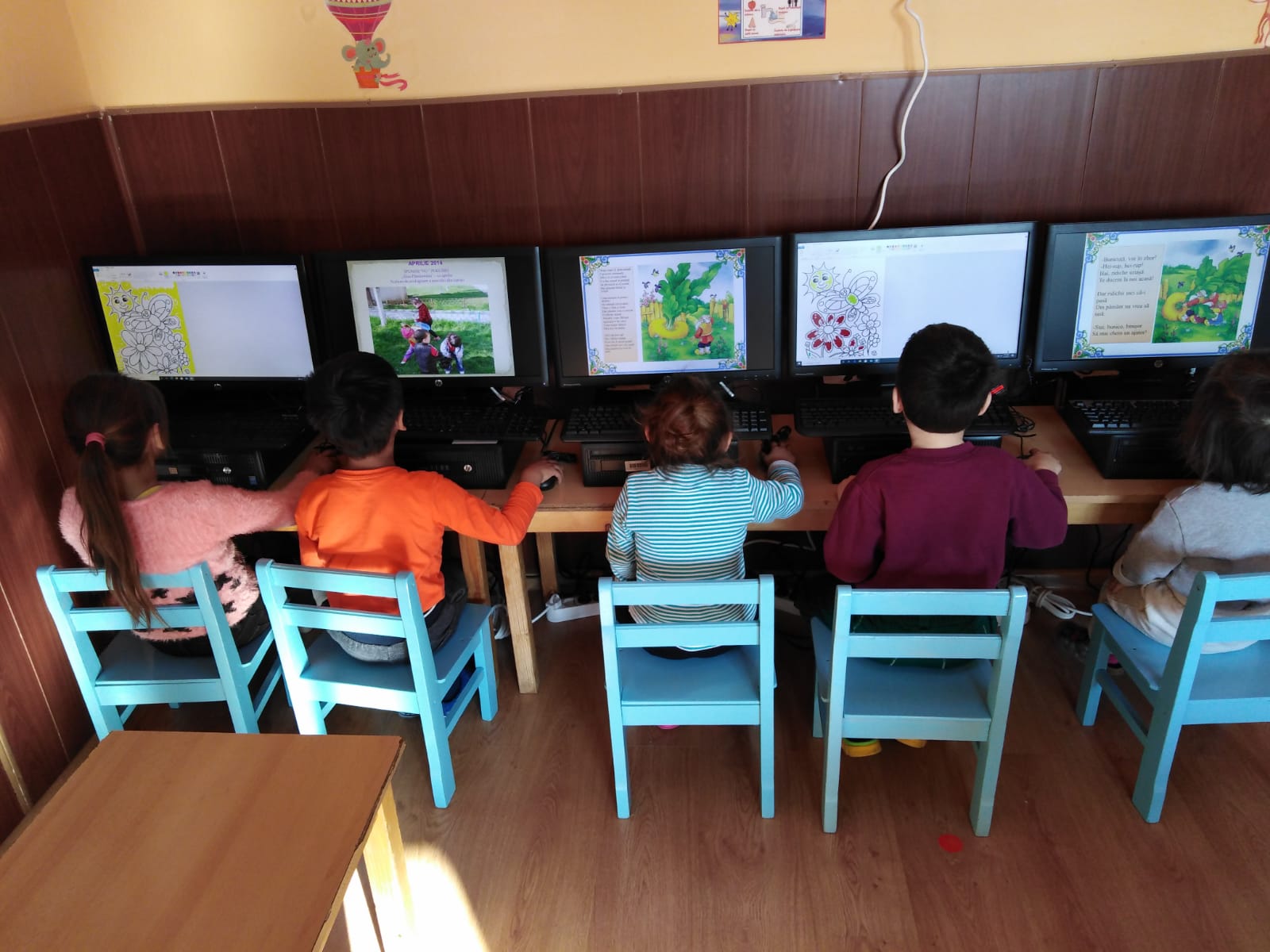
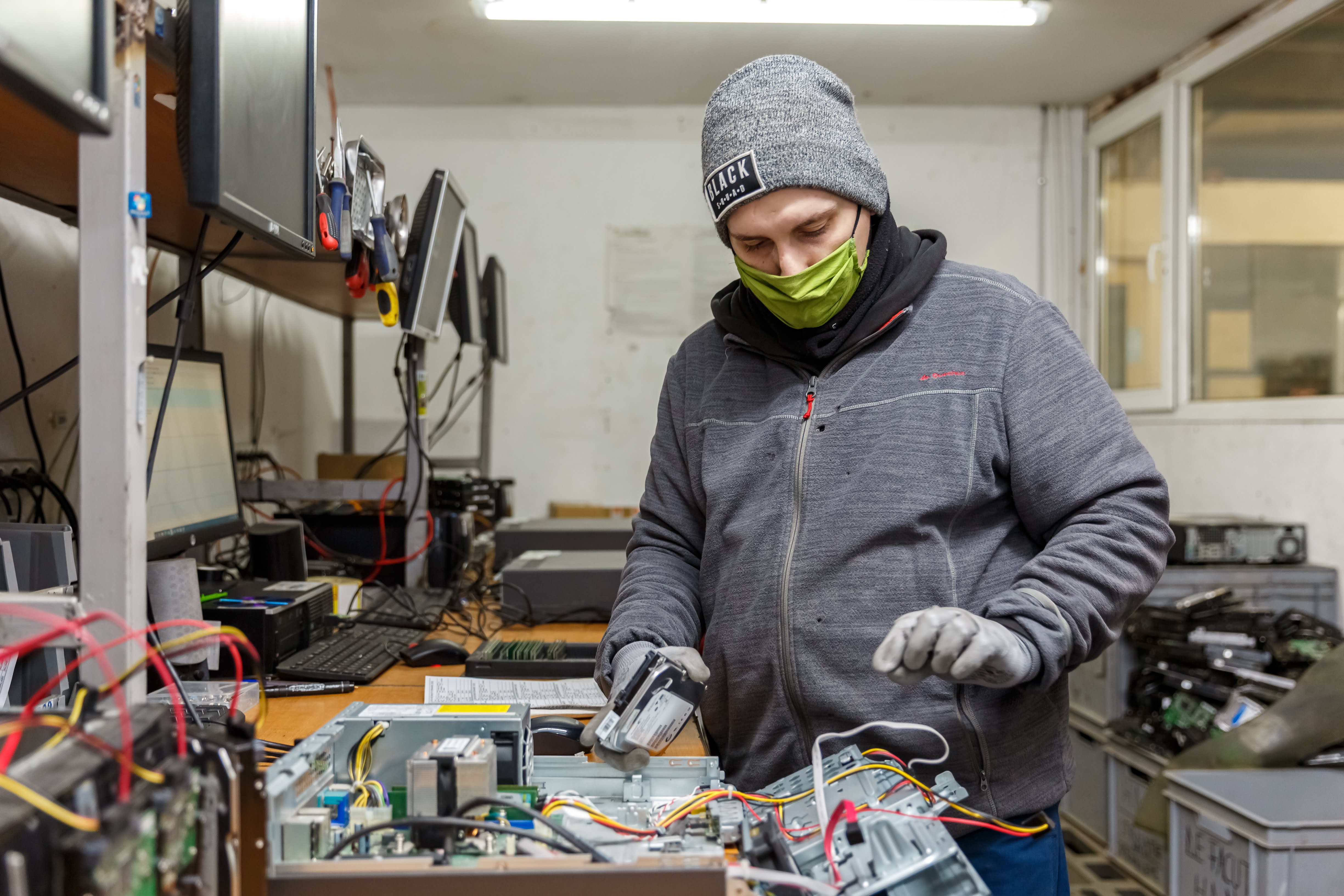
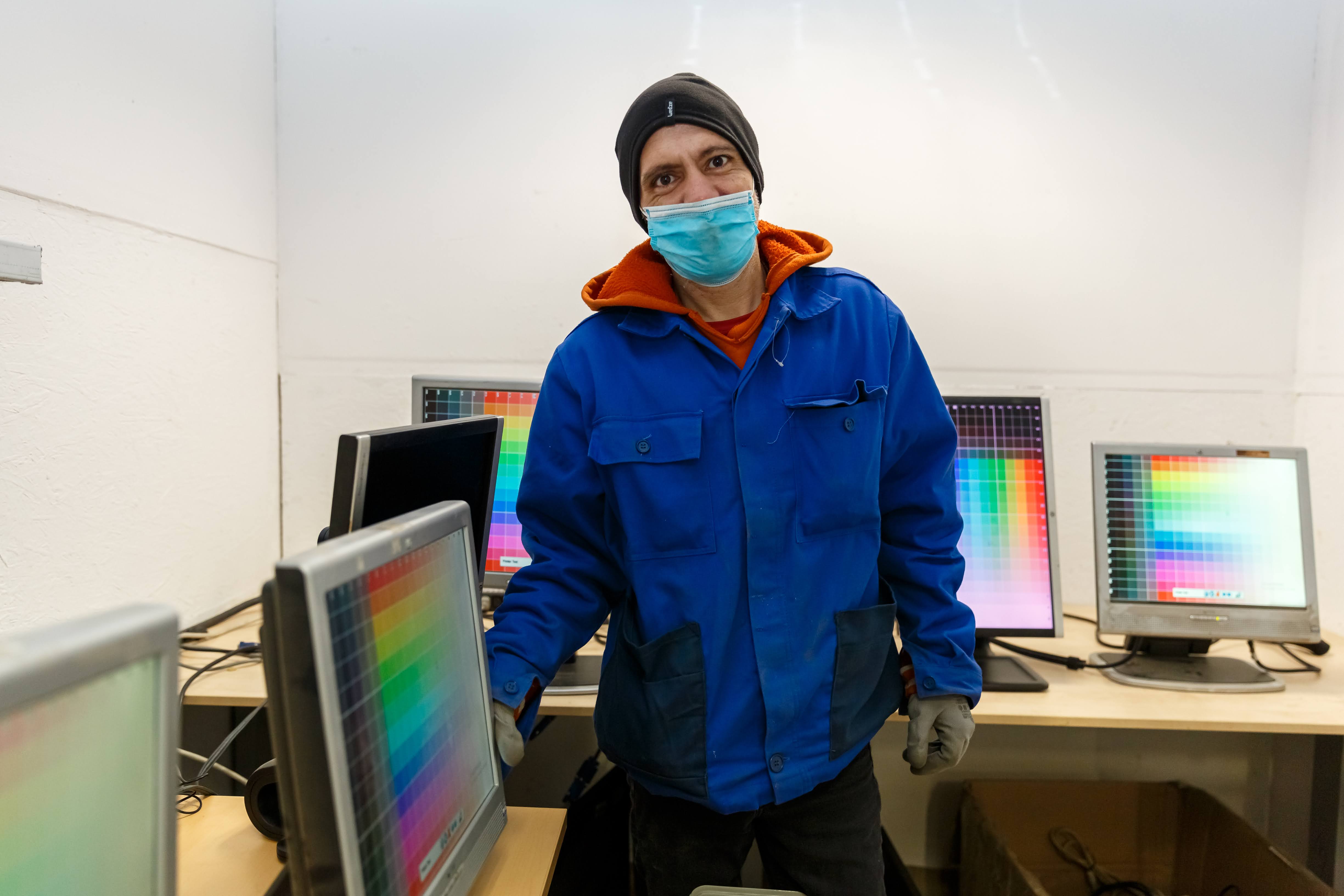
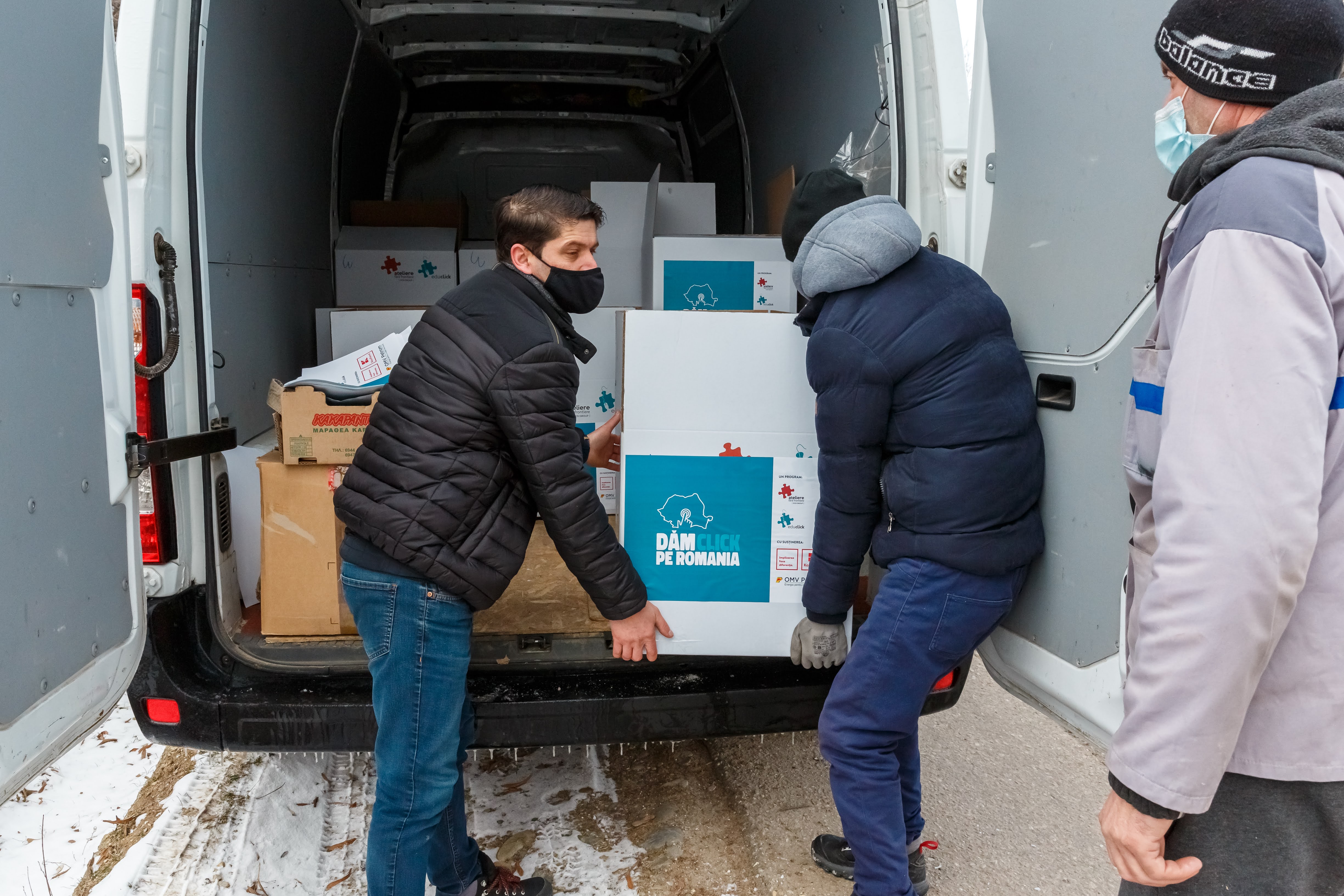
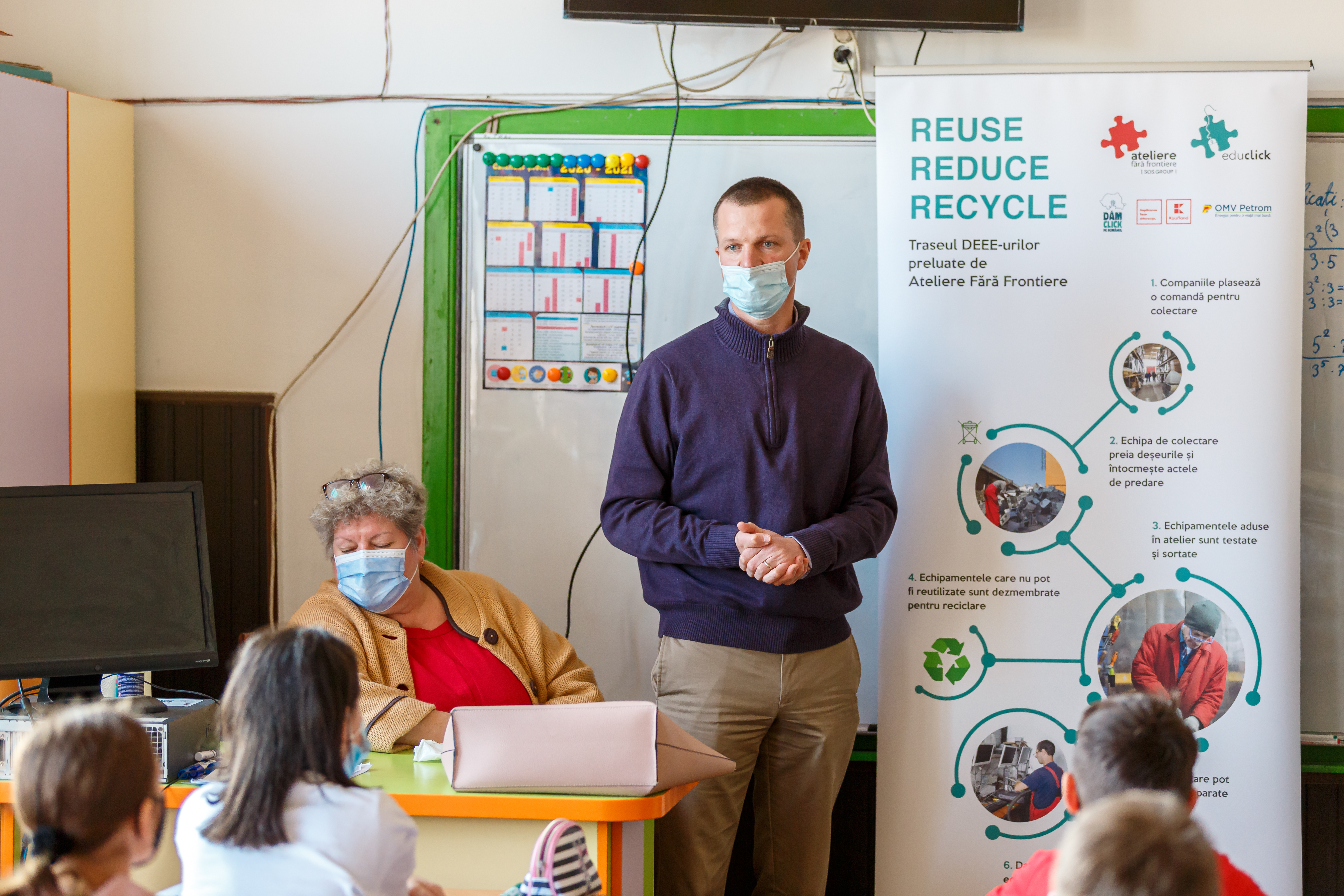
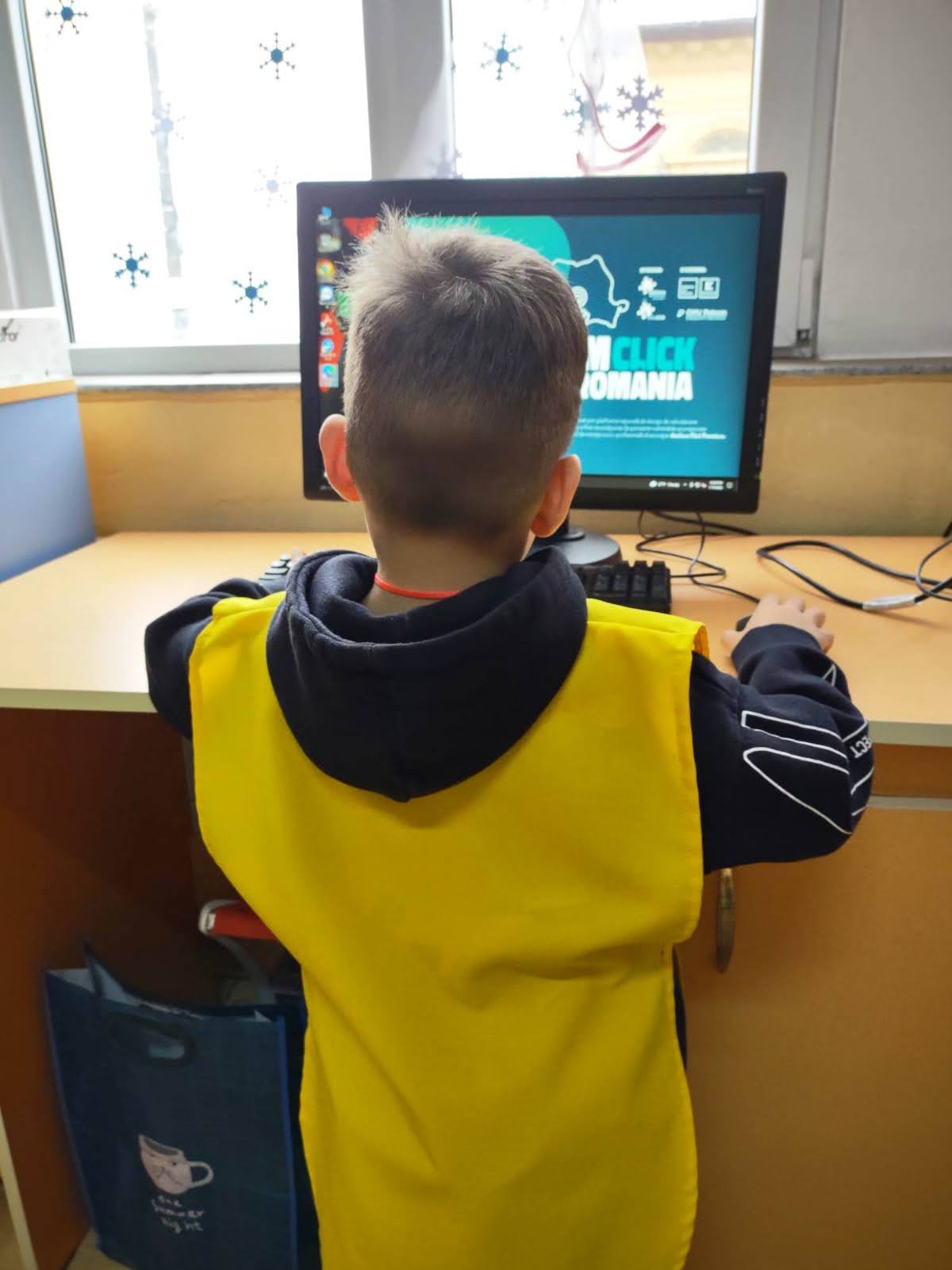
@Ateliere Fara Frontiere, 2020
Content licensed to the European Union.